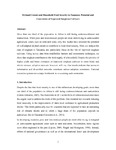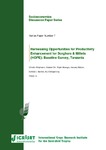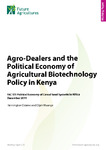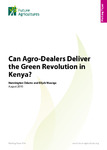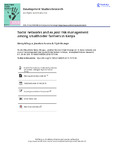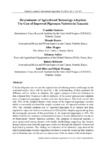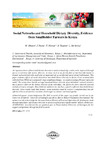Search
Now showing items 1-10 of 14
Dryland cereals and Household Food Security in Tanzania: Potential and Constraints of Improved Sorghum Cultivars
(2011)
More than one third of the population in Africa is still facing undernourishment and
malnutrition. While poor and food-insecure people are most often living in unfavourable
agricultural zones, such as semi-arid areas, ...
Harnessing Opportunities for Productivity Enhancement for Sorghum & Millets (HOPE): Baseline Survey, Tanzania
(ICRISAT, 2013)
The baseline survey was made in Singida Rural and Kondoa districts of Central Tanzania. A random sample of 360 farm households was sampled, divided into treatment, diffusion, and control groups. The survey was conducted ...
Agro-Dealers and the Political Economy of Agricultural Biotechnology Policy in Kenya
(Future Agricultures Consortium, 2011)
Public and private actors and their networks are committing substantial resources to support agro-dealers to
deliver novel technologies and information in line with the New Green Revolution for Africa. The main point ...
Can Agro-Dealers Deliver the Green Revolution in Kenya?
(Blackwell Publishing Ltd, 2010)
The Government of Kenya, with the backing of development and charitable organisations, has been implementing programmes to increase agricultural productivity
and rural incomes and trigger a new Green Revolution
(GR). ...
Social networks and ex post risk managementamong smallholder farmers in Kenya
(Taylor and Francis Group, 2019)
Smallholder farmers in developing countries are vulnerable to idiosyncratic and covariate risks. Therisks affect their welfare through the shocks they impose on income, assets, health and food supply.To cope with these ...
Determinants of Agricultural Technology Adoption: The Case of Improved Pigeonpea Varieties in Tanzania
(2011)
If dryland legumes are to meet the expectations of reducing poverty and hunger in the
semi-arid tropics, there will be need for a full understanding of their potential for
diffusion and the barriers to adoption. We apply ...
Social networks and ex post risk managementamong smallholder farmers in Kenya
(Routeledge Taylor & Francis group, 2019)
Smallholder farmers in developing countries are vulnerable to idiosyncratic and covariate risks. The risks affect their welfare through the shocks they impose on income, assets, health and food supply.To cope with these ...
Social Networks and Household Dietary Diversity, Evidence from Smallholder Farmers in Kenya.
(2018)
An important driver of household dietary diversity is nutrition knowledge which can be improved through
access to nutrition information. However, in many rural areas, formal flow of nutrition information is
limited, and ...
Social networks and farmer exposure to improved crop varieties in Tanzania
(2014-09)
In Sub-Sahara Africa, adoption rates of improved crop varieties remain relatively
low, which is partly due to farmers’ limited access to information. In smallholder settings,
information often spreads through informal ...
Watershed Improvement Review Board Calendar Year 2006 Annual Report, January 31, 2007
(2007)
The Iowa Watershed Improvement Review Board (WIRB) was created by the Iowa Legislature and signed into law by the Governor in 2005 as Senate File 200. This statute is now codified in Iowa Code Chapter 466A. The fifteen-member ...

